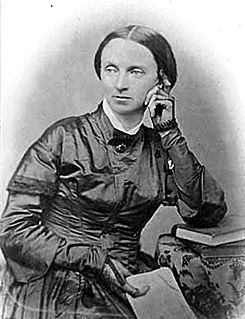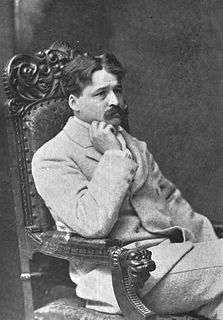Top 282 Benevolent Quotes & Sayings - Page 5
Explore popular Benevolent quotes.
Last updated on April 16, 2025.
I know that my work in this case is magnified by the fact that the streets of heaven are too crowded with angels. We know their names. They number a thousand for each one of the red ribbons that we wear here tonight. They finally rest in the warm embrace of the gracious creator of us all. A healing embrace that cools their fevers, that clears their skin, and allows their eyes to see the simple, self-evident, common sense truth that is made manifest by the benevolent creator of us all...
A benevolent malefactor, merciful, gentle, helpful, clement, a convict, returning good for evil, giving back pardon for hatred, preferring pity to vengeance, preferring to ruin himself rather than to ruin his enemy, saving him who had smitten him, kneeling on the heights of virtue, more nearly akin to an angel than to a man. Javert was constrained to admit to himself that this monster existed. Things could not go on in this manner.
You pass by a little child, you pass by, spiteful, with ugly words, with wrathful heart; you may not have noticed the child, but he has seen you, and your image, unseemly and ignoble, may remain in his defenseless heart. You don't know it, but you may have sown an evil seed in him and it may grow, and all because you were not careful before the child, because you did not foster in yourself a careful, actively benevolent love.
After the Second World War, facilitating the establishment of the UN and aiding the reconstruction of Europe, the United States was widely viewed, at least in the West, as a benevolent hegemon. In the non-West, the US was often perceived as a supporter of the colonial powers in their struggle to maintain control over their colonial possessions, and was viewed far more critically, especially by emerging elites that were more inclined to socialist development paradigms than to the capitalist ethos favoured by Washington.
If the layman cannot participate in decision making, he will have to turn himself over, essentially blind, to a hermetic elite. ... [The fundamental question becomes] are we still capable of self-government and therefore freedom? Margaret Mead wrote in a 1959 issue of Daedalus about scientists elevated to the status of priests. Now there is a name for this elevation, when you are in the hands of-one hopes-a benevolent elite, when you have no control over your political decisions. From the point of view of John Locke, the name for this is slavery.
Today I weep for my country. No more is the image of America one of strong, yet benevolent peacekeeper. ... Around the globe, our friends mistrust us, our word is disputed, our intentions are questioned. We flaunt our superpower status with arrogance....After war has ended the United States will have to rebuild much more than the country of Iraq. We will have to rebuild America's image around the globe.
The real trouble is that 'kindness' is a quality fatally easy to attribute to ourselves on quite inadequate grounds. Everyone feels benevolent if nothing happens to be annoying him at the moment. Thus a man easily comes to console himself for all his other vices by a conviction that 'his heart's in the right place' and 'he wouldn't hurt a fly,' though in fact he has never made the slightest sacrifice for a fellow creature. We think we are kind when we are only happy: it is not so easy, on the same grounds, to imagine oneself temperate, chaste, or humble.
there is a God, there always has been. I see him here, in the eyes of the people in this [hospital] corridor of desperation. This is the real house of God, this is where those who have lost God will find Him... there is a God, there has to be, and now I will pray, I will pray that He will forgive that I have neglected Him all of these years, forgive that I have betrayed, lied, and sinned with impunity only to turn to Him now in my hour of need. I pray that He is as merciful, benevolent, and gracious as His book says He is.
One of the great things about a free market is that it's inherently and indefatigably Darwinistic. Left to its own devices, a free market will eventually weed out the stupid from both 'ends' of the food chain otherwise described as supply and demand. As money is liberated from the hands of the stupid, those who would sell products or services to the stupid will eventually lose their share of the marketplace. Devoid of any 'benevolent' interference from government, the process is gloriously relentless, and cannot help but yield a successively smarter class of participants.
They always mean beautiful things like hummingbirds. I always reply by saying that I think of a little child in east Africa with a worm burrowing through his eyeball. The worm cannot live in any other way, except by burrowing through eyeballs. I find that hard to reconcile with the notion of a divine and benevolent creator.
It is pleasure that lurks in the practice of every one of your virtues. Man performs actions because they are good for him, and when they are good for other people as well they are thought virtuous: if he finds pleasure in helping others he is benevolent; if he finds pleasure in working for society he is public-spirited; but it is for your private pleasure that you give twopence to a beggar as much as it is for my private pleasure that I drink another whiskey and soda. I, less of a humbug than you, neither applaud myself for my pleasure nor demand your admiration.
Tracing the progress of mankind in the ascending path of civilization, and moral and intellectual culture, our fathers found that the divine ordinance of government, in every stage of the ascent, was adjustable on principles of common reason to the actual condition of a people, and always had for its objects, in the benevolent councils of the divine wisdom, the happiness, the expansion, the security, the elevation of society, and the redemption of man. They sought in vain for any title of authority of man over man, except of superior capacity and higher morality.
Beneficence is a duty. He who frequently practices it, and sees his benevolent intentions realized, at length comes really to love him to whom he has done good. When, therefore, it is said, "Thou shalt love thy neighbor as thyself," it is not meant, thou shalt love him first and do him good in consequence of that love, but, thou shalt do good to thy neighbor; and this thy beneficence will engender in thee that love to mankind which is the fulness and consummation of the inclination to do good.
The brown blotches of the benevolent skin cancer the sun brings from its reflection on the tropic sea were on his cheeks. The blotches ran well down the sides of his face and his hands had the deep-creased scars from handling heavy fish on the cords. But none of these scars were fresh. They were as old as erosions in a fishless desert.
The gods in Yoruba mythology are not remote at all. They're benign, they're malign, they are mischievous, like Eshu for instance, tricksters, rascally, fornicators, that's a similarity to Greek mythology, for instance, you know. They're not saints, they're not saints. They're powerful. It's why they're not tyrannical. Of course, a number of them are also very, you know, benevolent, you know, there are saintly virtues to be found in them.
He wore a sprinkling of powder upon his head, as if to make himself look benevolent; but if that were his purpose, he would perhaps have done better to powder his countenance also, for there was something in its very wrinkles, and in his cold restless eye, which seemed to tell of cunning that would announce itself in spite of him.
If the benevolent ruler stays in power long enough, he eventually concludes that power and wisdom are the same thing. And as he possesses power, he must possess wisdom. He becomes converted to the seductive thesis that election to public office endows the official with both power and wisdom. At this point, he begins to lose his ability to distinguish between what is morally right and what is politically expedient.
The quest for a war-free world has a basic purpose: survival. But if in the process we learn how to achieve it by love rather than by fear, by kindness rather than by compulsion; if in the process we learn to combine the essential with the enjoyable, the expedient with the benevolent, the practical with the beautiful, this will be an extra incentive to embark on this great task.
Thin clouds form, and the shadows lengthen out. They have no breadth, as summer shadows have; there are no leaves on the trees or fat clouds in the sky to make them thick. They are gaunt, mean shadows that bite the ground like teeth. As the sun nears the horizon, its benevolent yellow begins to deepen, to become infected, until it glares an angry inflamed orange. It throws a variegated glow over the horizon.
Philosophers should consider the fact that the greatest happiness principle can easily be made an excuse for a benevolent dictatorship. We should replace it by a more modest and more realistic principle - the principle that the fight against avoidable misery should be a recognized aim of public policy, while the increase of happiness should be left, in the main, to private initiative.
There is a striking parallel between the spreading of germs and the spreading of ideas or propaganda. On the one hand we are dealing with a virus which can be transported and transmitted under certain conditions which favor or limit its transportation or transmission: on the other hand with ideas, religions, and doctrines, which can be described as germs, benevolent or malevolent, according to the point of view one takes up. These germs can either remain at their source and be sterile, or emerge in the spreading of infection.
Health education emphasizing risks is a form of pedagogy, which, like other forms, serves to legitimize ideologies and social practices. Risk discourse in the public health sphere allows the state, as the owner of knowledge, to exert power of the bodies of its citizens. Risk discourse, therefore, especially when it emphasizes lifestyle risks, serves as an effective Foucauldian agent of surveillance and control that is difficult to challenge because of its manifest benevolent goal of maintaining standards of health. In doing so, it draws attention away from the structural causes of ill-health.
Psychologist Nathaniel Branden speaks of a benevolent sense of life possible to those with rational, productive values, vividly contrasted with the coercive parasitic group-culture of mystics and altruists we live in, where people all around you seem a burdensome annoyance, a threat to your survival. Having been told from childhood that life is a zero-sum game in which you owe everything to others, at some level you worry all the time that someday the bastards will collect. And collect they do, every April 15th. Why do you think they call it collectivism?
The promulgation of the great doctrines of religion, the being, and attributes, and providence of one Almighty God: the responsibility to him for all our actions, founded upon moral freedom and accountability; a future state of rewards and punishments; the cultivation of all the personal, social, and benevolent virtues-these these never can be a matter of indifference in any well-ordered community. It is, indeed, difficult to conceive how any civilized society can exist without them.
I had gone into the hospital with the stupid notion that its primary object was the care and comfort of the sick and wounded. It was long after that I learned that a vast majority of all benevolent institutions are gotten up to gratify the aesthetic tastes of the public; exhibit the wealth and generosity of the founders, and furnish places for officers. The beneficiaries of the institutions are simply an apology for their existence, and having furnished that apology, the less said about them the better.
During intermission she peeked out at the theater, watching it refill. When it was almost full and the lights blinked on and off, she saw three people file in through the center door and her breath caught. Time lapsed as they walked down the center aisle: three teenage girls all in a row. They were so big, so bright, so beautiful, so magnificent to Carmen’s eyes that she thought she was imagining them. They were like goddesses, like Titans. She was so proud of them! They were benevolent and they were righteous. Now, these were friends.
No man, however benevolent, liberal, and wise, can use a large fortune so that it will do half as much good in the world as it would if it were divided into moderate sums and in the hands of workmen who had earned it by industry and frugality. The piling up of estates often does great and conspicuous good.... But no man does with accumulated wealth so much good as the same amount would do in many hands.
Finally it should be the earnest wish and paramount aim of the military administration to win the confidence, respect, and affection of the inhabitants of the Philippines by assuring them in every possible way that full measure of individual rights and liberties which is the heritage of free peoples, and by proving to them that the mission of the United States is one of benevolent assimilation substituting the mild sway of justice and right for arbitrary rule.
The men and woman who make the best boon companions seem to have given up hope of doing something else...some defect of talent or opportunity has cut them off from their pet ambition and has thus left them with leisure to take an interest in their lives of others. Your ambition may be, it makes him keep his thoughts at home. But the heartbroken people - if I may use the word in a mild, benevolent sense - the people whose wills are subdued to fate, give us consolation, recognition, and welcome.
We believe in being honest, true, chaste, benevolent and in doing good to all men; indeed we may say that we follow the admonition of Paul - We believe all things, we hope all things, we have endured many things and hope to be able to endure all things. If there is anything virtuous, lovely, or of good report or praiseworthy, we seek after these things.
... so large a portion of those who hold much capital, instead of using their various advantages for the greatest good of those around them, employ the chief of them for mere selfish indulgences; thus inflicting as much mischief on themselves, as results to others from their culpable neglect. A great portion of the rich seem to be acting on the principle, that the more God bestows on them, the less are they under obligation to practise any self-denial, in fulfilling his benevolent plan of raising our race to intelligence and holiness.
The core problem isn’t the fact that we’re lukewarm, halfhearted, or stagnant Christians. The crux of it all is why we are this way, and it is because we have an inaccurate view of God. We see Him as a benevolent Being who is satisfied when people manage to fit Him into their lives in some small way. We forget that God never had an identity crisis. He knows that He’s great and deserves to be the center of our lives.
For instance, dragons are deeply revered by the Chinese. According to legend they have megapowers that include weather control and life creation. And they’re seen as kind, benevolent creatures. Funny. Every fairy tale I’d ever heard involving dragons starred daring knights trotting off to kill said dragons. Probably the real reason every time East meets West they get pissed off and throw tea in our faces.
There is in every breast a sensibility to marks of honor, of favor, of esteem, and of confidence, which, apart from all considerations of interest, is some pledge for grateful and benevolent returns. Ingratitude is a common topic of declamation against human nature; and it must be confessed, that instances of it are but too infrequent and flagrant both in public and in private life. But the universal and extreme indignation which it inspires, is itself a proof of the energy and prevalence of the contrary sentiment.
Kids don't have a little brother working in the coal mine, they don't have a little sister coughing her lungs out in the looms of the big mill towns of the Northeast. Why? Because we organized; we broke the back of the sweatshops in this country; we have child labor laws. Those were not benevolent gifts from enlightened management. They were fought for, they were bled for, they were died for by working people, by people like us. Kids ought to know that.
If one yearns to see the face of the Divine, one must break out of the aquarium, escape the fish farm, to go swim up wild cataracts, dive in deep fjords. One must explore the labyrinth of the reef, the shadows of the lily pads. How limiting, how insulting to think of God as a benevolent warden, an absentee hatchery manager who imprisons us in the 'comfort' of artificial pools, where intermediaries sprinkle our restrictive waters with sanitized flakes of processed nutriment.
For the most part, my characters don't talk to me. I like to lord over them like some kind of benevolent deity. And, for the most part, my characters go along with it. I write intense character sketches and long, play-like conversations between me and them, but they stay out of the book writing itself.
Many of us regard ourselves as mildly liberal or centrist politically, voice fairly pleasant sentiments about our poor children, contribute money to send poor kids to summer camp, feel benevolent. We're not nazis; we're nice people. We read sophisticated books. We go to church. We go to synagogue. Meanwhile, we put other people's children into an economic and environmental death zone. We make it hard for them to get out. We strip the place bare of amenities. And we sit back and say to ourselves, "Well, I hope that they don't kill each other off. But if they do, it's not my fault.
Lots of people today would never consider themselves guilty of idolatry as far as it is spelled out in the Ten Commandments, but by reducing God to some benevolent "man upstairs" whose only attributes are love and tolerance, and who could not care less about sin, they truly have transgressed God's commandment. They have created a god in their mind who does not actually exist and will on the day of judgment, not be able to offer them any help.
Muslims have been an almost entirely benevolent force in the 20th century. They did not wreak the havoc the Western powers wreaked on the world. They have not come anywhere near to the environmental degradation that we've done to the planet. So I think Muslims need to be seen in the proper light. They're mostly decent, hardworking people, people with deep family values, and they want to live in peace.
It is easy to see things in retrospect. But I was ignorant then of everything but my own happiness, and I don’t know what else to say except that life itself seemed very magical in those days: a web of symbol, coincidence, premonition, omen. Everything, somehow, fit together; some sly and benevolent Providence was revealing itself by degrees and I felt myself trembling on the brink of a fabulous discovery, as though any morning it was all going to come together–my future, my past, the whole of my life–and I was going to sit up in bed like a thunderbolt and say oh! oh! oh!









































